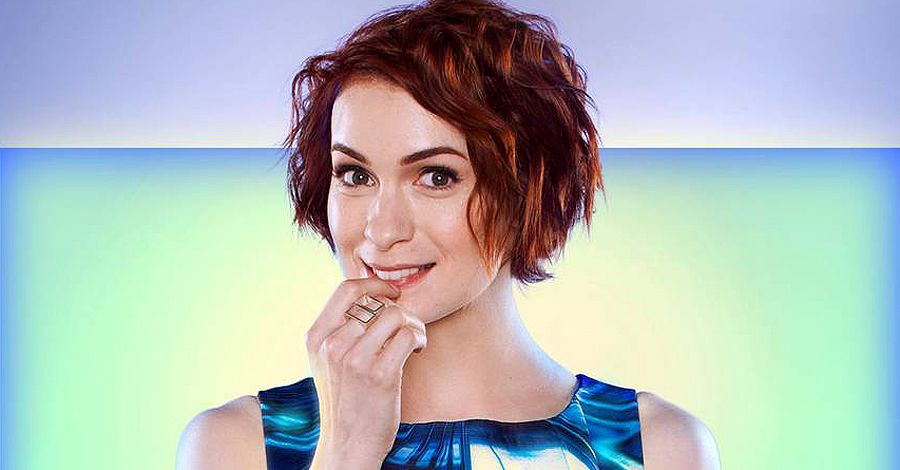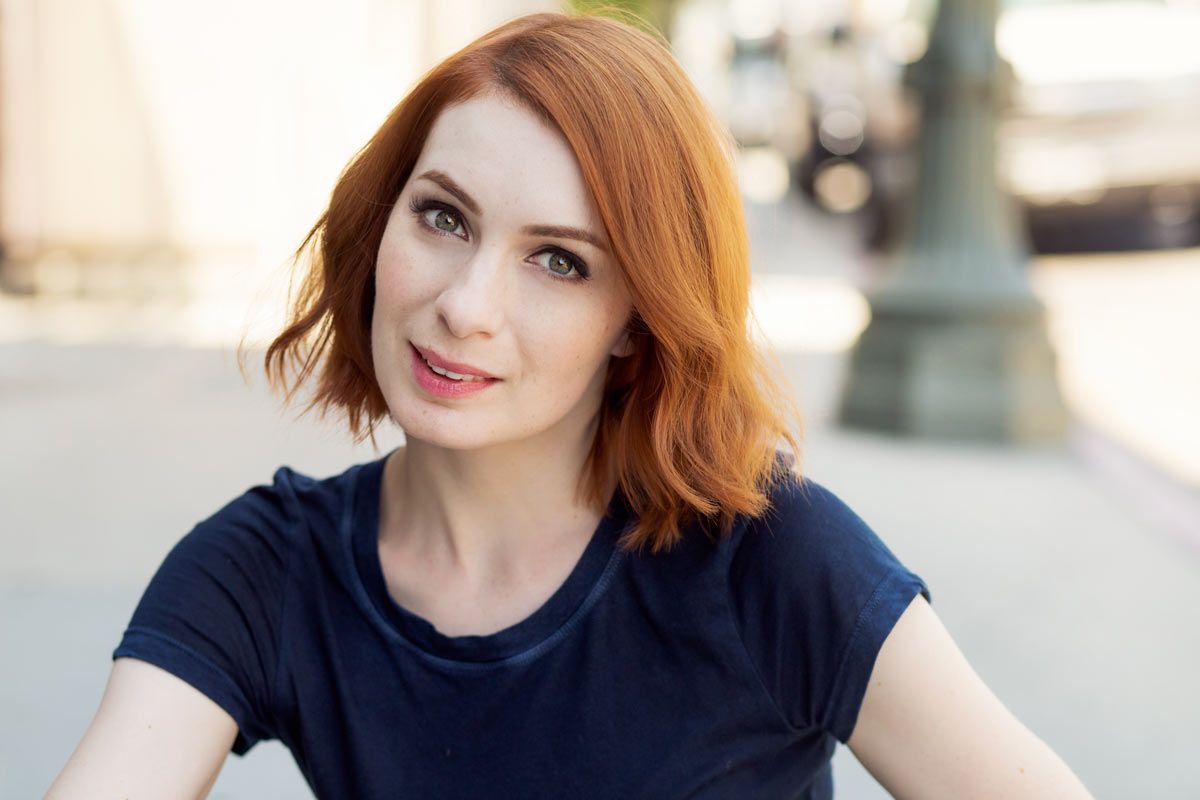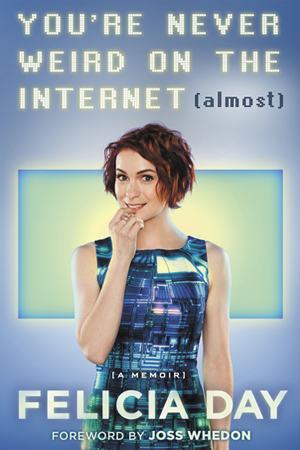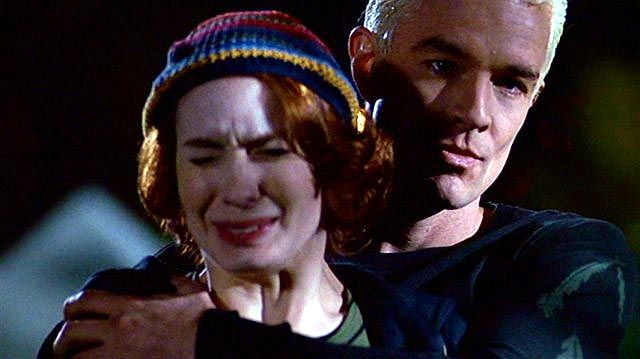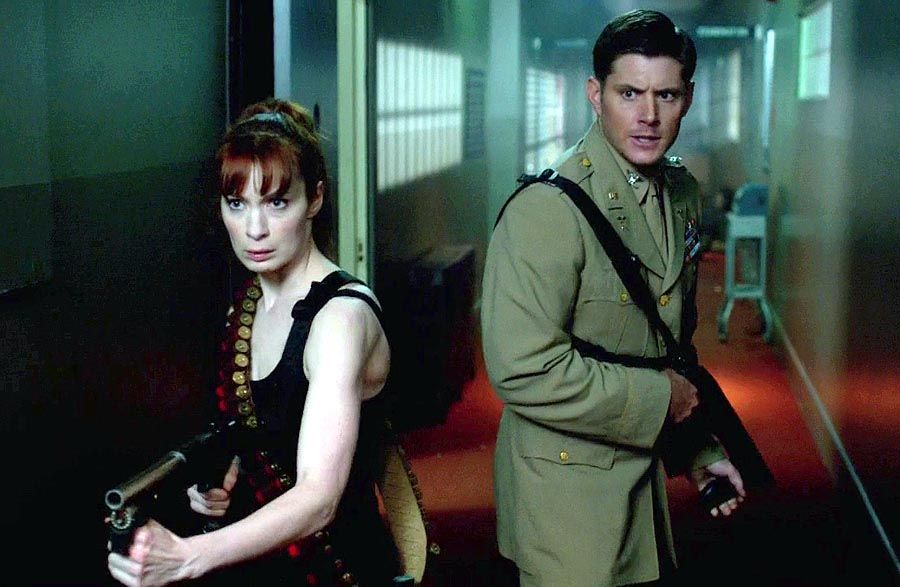Although Felicia Day bristles at being called “Queen of the Geeks,” the actress has certainly earned the title after beloved roles in “Buffy the Vampire Slayer,” “Supernatural,” “Eureka” and Joss Whedon’s Internet musical “Dr. Horrible’s Sing-Along Blog.”
And let’s not forget her YouTube channel Geek & Sundry, her web series “The Guild” (loosely based on her life as a gamer) and “Dragon Age: Redemption,” frequent appearances on Wil Wheaton’s “Tabletop,” and upcoming roles in Alan Tudyk’s comedy “Con Man” and the animated adaptation of the comic “Chew.”
Now the busy Day has written a memoir, "You're Never Weird on the Internet (Almost)," which chronicles the quirky upbringing that shaped her life and career.
She recently spoke with SPINOFF about the message behind her book, which goes on sale this week, and why she's proud to be a geek. In addition, Day discussed her fan-favorite "Buffy" and "Supernatural" roles, as well as her television aspirations.
Spinoff Online: When was the first time you heard someone refer to you as "Queen of the Geeks," and what did it mean to you?
Felicia Day: I heard that very early on in my career, when, I think, the Xbox picked up "The Guild." Someone coined me "the Queen of the Geeks" and of course, I shuddered. Whenever you get a label put on you, there are going to be people that take you for a target and want to take you down a notch. Since I've been raised on the Internet, I know hubris is something that is definitely a red flag. You are never going to get a big ego on the Internet because you are going to see the best and the worst of you all the time. I'm honored to be able to represent a lady side to geekdom, but, to me, I was always a geek first and foremost.
You have a crazy schedule already with so many projects in the air. What prompted you to write this memoir, "You're Never Weird on the Internet," at this point in your career?
I never really set out to write a memoir, but over the years, especially after I started my own business, Geek & Sundry, I went around a lot doing speeches and presentations to corporations and universities. A lot of the themes I talk about in my work, namely embracing your weirdness and creating despite all the barriers you encounter when trying to be a creator, resonated with people. When I got the opportunity, I got excited about the idea of putting it in a permanent volume. I'm a huge reader, so having a book is a big, monumental task that I dreamed about doing my whole life.
When sitting down to map everything out, how did you decide which details to focus on and which ones to exclude?
In any writing, the outline tends to be the template, the architecture of whatever you do. You get to prevent a lot of accidents by building your outline properly, at least in my world. Talking about yourself is kind of exhausting. I didn't want it to be about me just being funny or "Look how awesome I am." Every step of the way, I'd back up and think, "OK. What does this chapter have to do with inspiring somebody else? What if I was a random person who didn't know my work? What would I take away from this that could improve my life in a small or large way?" Whether it was picking up a comic book or video game for the first time, because I made it seem fun, or picking up a pen or writing in a journal or creating your own novel or web series, I wanted the book to be useful.
Did you talk to family, friends or former co-workers to jog your memory?
I spent a whole year writing it, and another several months rewriting, because I really wanted to put my heart and soul in it as a creator. Definitely doing business endeavors over the last several years has taken a lot of my attention. This was really a creative project I dug into with relish. I did talk to family members. I went through a lot of old emails. Any kind of photos I had, I perused just to have my memory jogged. It's amazing what you forget, but it's the things that stand out to you that are usually very strong emotional memories, either very positive or very negative. In order to get the funnier, quirky stories, I did a lot of homework on myself, which was self-therapeutic in a way. Looking at your own journey in an objective way is really valuable for anyone. Whether it's writing a memoir or just trying to look at your life, it's a very valuable exercise.
Writing a book can be rewarding, but also tedious. What did you love and hate about the process?
I certainly was intimidated and didn't pick up a pen for a while. It's one thing to write a short, but it's another to write a screenplay and it's certainly another to write a book. I had to be very mathematical about it and create a routine for myself that made me have a daily habit. That's the only way I got through it. I used a program called Scrivener. It's very convenient. You can break your script or manuscript into pieces. I set a daily work goal for myself, which I read about and had gotten advice from other authors to do. Slowly, but surely, showing up every day – even if I only got 500 words down – was initially freeing. It's really weird when you put a lot of structure in yourself and how freeing that can be. You know exactly the beginning, middle and end of your time. That really helped a lot, as well as a lot of outlining, backing up and brainstorming within those parameters I set for myself.
The memoir doesn't gloss over some of the heavier topics. Why was it important to share your struggles with things like depression?
A lot of times, we see someone else's success. I know in the past I've been jealous or I feel entitled to their success as well. That motivates me. I want to be like them or I want that success. A big lesson I've learned in life is just because someone is successful doesn't mean they haven't struggled or had a very hard time with it. In fact, success in itself brings a lot of problems that a lot of people don't talk about. What I wanted to do was strip away the process of how I did what I did. I'm not the most famous. I'm not the best at a lot of things, but I've gotten some success being sort of an outsider and building everything by hand. I wanted everyone to see how hard it is, the process of success or failure or creativity, so they won't feel alone when they feel those things. I guarantee you no matter who it is, they've gone through periods where their career was frustrating, where they didn't know how to sit down and create, or they felt alone and down. Maybe they had chemicals in their brain telling them they're unhappy. The more I think you can be honest about those things, the more people feel included and can accept themselves and get through it, versus be defeated.
Were you surprised at how cathartic it must have been getting that all down on paper?
I was very surprised about how I was able to draw a line between some patterns in my behavior and incidents in my childhood, or how patterns in the way I grew up influenced who I am. A lot of the themes that are the strongest in the book came out in the process of writing it. I didn't really set out with firm thematic ideas, but, slowly but surely, being objective about who I am led to me drawing some conclusions that today I actually am able to be a better person for.
One of the lines in your memoir states, "Weirdness turned into my greatest strength in life." Can you expand on that and why that might resonate with a lot of readers?
No matter who you are, you are made to feel like an outsider at some point in your life, especially on the internet where there's anonymity cloaking people's angriness, which is channeled into negativity. I've seen everything said about myself in the world that's negative. I even saw a comment on somebody else's video that was criticizing them for being too pretty. Everybody feels rejected and shunned in life, especially if you are odder than most or have traits that make you stand out, regardless of your background, religion, race or something that you are passionate about that is not very mainstream. In life, if you look at things that will last the test of time – like the Eiffel Tower, Elvis, Galileo or anybody who stands out in entertainment and inventions – those people were pushed back upon. Those people were considered weird and outlaws and not embraced by the mainstream. They are the ones who last the test of time, not the people who were trying to police or negate their behavior. It's too sad to see someone who has a passion for something that's not accepted by the people around them to abandon it just to fit in. That's really your super powers, are the things that make you unique and your unique point of view on the world. That's really the heart of my story and why I love the Internet. It allows people to connect with others.
Now is a different time than when you were growing up. Why is it cooler than ever to be a geek?
Geekdom is a reflection of people embracing their interests, no matter what they are. The very architecture of the internet reinforces that. There are so many sub-groups that have a voice now and where people feel like they belong. People didn't have that when we were just tied to our physical world. Geeks were pushed to the outside more frequently in years past and that's why geeks tended to create the way we operate online. The very structure of how we log on and find people is based on our interests. That is something that has spread out to people who are fans of sports teams or reality stars. These are things that aren't necessarily geeky, but allow people to feel they belong and let their passions ignite. The strength of geek culture in entertainment nowadays allows people to pursue those interests more than in past years.
Looking at your career, you had recurring roles on two series with extremely loyal fanbases. How surreal was it to have been part of "Buffy the Vampire Slayer"?
I had no idea the impact it would have on my life, being hired for a job I auditioned for out of many. I was so blessed to be on that show because not only did it help my career quite a bit, it made me understand how awesome it is to be part of a TV family. It introduced me to the Whedonverse, and I have friends from that experience to this day are some of my closest friends, who I respect and love. It's really a testament to Joss Whedon and how he brings people together and creates an environment of creativity and love. He did the forward to my book, which I didn't even have to ask him to do. He offered in the middle of “Ultron” being released to write a forward. I was like, "Sure. I'm so sorry. You're offering this, but I don't want to distract you." It also made me be very careful about the projects that I pick and the things that I make. I could easily be on a half-hour show on a network right now. But, the TV shows I picked have been all shows that have that sense of family and fandom around them. It's not just a job for me; it's a lifestyle and a passion. I want to feel that sense of community with whatever I do behind the camera or in front of it.
A lot of "Supernatural" viewers were crushed when your character Charlie was killed this season. How did you feel about that development and the way she went out?
As someone who has written a lot and knows the relationship between an actor and a show on a much smaller level, I can never be insulted when I am killed. I have been killed a lot, to be honest with you. I'm very killable. When the writers and producers called me and said that was going to happen, I just said, "I'm sure this is the best thing you need to do for the show. I'm supportive of your decision because you have a bigger idea of what you need in the show." Of course, as a person, it was kind of heartbreaking because I love working on the show. The cast and crew were really a family for me that followed the Whedonverse. Not being able to be on set or have sushi in Vancouver while I was working up there was kind of sad for me. But, it's completely understandable in the grand scheme of things. I'm glad Charlie was able to be a part of the "Supernatural" world as long as she was because I was really only supposed to do one episode.
As a major gamer, what are your thoughts on the upcoming "Warcraft" feature film?
I'm very excited. I'm very fortunate to be working with Legendary, because they own my company Geek & Sundry. I fully intend on getting a sneak preview when the movie is finished. From what I've seen, it looks amazing. I would love to see more video games done right because a lot of video game adaptations have been watered down. It's a hard challenge to distill someone's experience that could be hundreds of hours of their life into an hour and a half. I hope this starts a new renaissance, not only of movie adaptations of video games that I love, but on TV.
Let's get this out there: You love "Agent Carter" and "Gotham." What do you enjoy about those shows and in what capacity would you like to guest star?
I love "Agent Carter" because of the characters and the setting. I'm a huge fan of the ‘30s and ‘40s, and the detective-noir, “Perry Mason” kind of stuff. I feel like my hair is a great length, and I'd look really good in period outfits. I've done a movie with Kenneth Branagh where I was in the ‘20s [2005’s “Warm Springs”]. I feel like I have that going for me. The music of the era and the idea you could have a theatrical production going on somehow, I would love to see that aspect of New York.
And "Gotham" is just crazy. That finale last year was like, "Is everyone on crack?" I love how crazy-balls it is, but so serious. It makes me so happy. This dark and gritty stuff is very common. That's not stuff I necessarily respond to. The dark grittiness with the sense of ridiculousness of "Gotham" is really what attracts me to it. You never know what anyone is going to do and that's exciting.
Lastly, what was the nerdiest thing you did or bought at Comic-Con this year?
Everything is nerdy. I insisted on posing with a 12-foot “Warcraft” orc sculpture with a very big sword, and jumping off of it in a way I almost hurt my ankle badly. Chris Hardwick inspired me to do it, so I had to be a follower. I also saw Steven Moffat's hair from afar and actually had some acid reflux from excitement. That was probably my nerdiest reaction.

